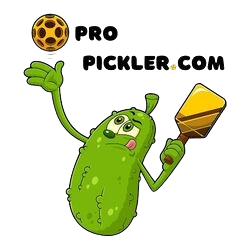I recently attended a pickleball webinar where an intriguing question was posed: How do you stay calm on the court? While the person who asked the question didn’t provide further context, it got me thinking about the importance of composure and managing emotions while playing pickleball.
Whether it’s dealing with competitive situations, unfamiliar opponents, or tournament pressure, staying calm is crucial for optimal performance. In this article, we will explore effective strategies to help you maintain composure and stay calm on the pickleball court.
Remember the Purpose of Pickleball: Fun and Improvement
Amidst the intensity of drop-in games and tournaments, it’s essential to remember why you play pickleball in the first place. For most people, pickleball is an opportunity to exercise, improve their skills, and have fun.
While some players are highly competitive and dislike losing, it’s important to strike a balance and prioritize enjoyment. By keeping the fun aspect in mind, you can alleviate unnecessary pressure and maintain a calm demeanor throughout the game.
Recognize the Fine Line Between Anxiety and Excitement
Anxiety and excitement are closely related emotions, and how we perceive them depends on our mindset. By reframing anxiety as excitement, you can transform nervousness into a positive energy that fuels your performance.
If you feel nervous in new situations or before tournaments, consider whether it negatively affects your game. If not, embrace the butterflies as a sign of excitement and readiness. However, if your nervousness hinders your performance, try implementing the following techniques.
Breathing Exercises for Calming the Mind
One effective technique to calm your mind is practicing breathing exercises. Transcendental meditation offers a popular method where you count your breaths from five to one and then from one to five. This exercise can be done between points to help you regain focus and composure. Additionally, taking a deep breath just before serving or when your opponent serves can help center your mind and promote a sense of calmness.
Managing Anger on the Pickleball Court
Anger can arise during intense sports matches, whether due to personal performance or external factors like opponents’ behavior. To effectively manage anger on the pickleball court, it’s crucial to acknowledge and understand its cause. Once you recognize your anger, you can take steps to control it.
Start by consciously relaxing your muscles, as anger often leads to tension and raised shoulders. Allow your shoulders to drop and shake out any excessive muscle tension. This simple act of loosening your body can have a positive impact on your mental game.
Breathing techniques also play a significant role in re-centering your mind. By focusing on your breath and turning your thoughts inward, you can regain control over your emotions. Redirect your attention to what you can control and engage in positive self-talk. If you’re angry at yourself for missing a shot, remind yourself that mistakes happen and that they don’t define your pickleball skills. Slow down, acknowledge your efforts, and reward yourself for your commitment and hard work.
Sometimes, taking a timeout is necessary to fully recover from anger. Step away from the game, drink water, stretch, and seek support from a teammate or friend. Once you’ve calmed down, you can return to the match with a renewed focus.
Visualization is a scientifically proven technique that can benefit athletes. Treat each game as a learning opportunity, analyzing each rally, your opponent’s strategies, and your own performance. Visualize how you can improve both mentally and physically for your next point or shot. By focusing on visualization and strategic thinking, you can effectively manage your anger and maintain composure on the court.
Strategies for Beginner Pickleball Players
Beginners often experience nervousness when learning a new skill. To stay calm and build confidence, it’s essential to practice regularly and focus on mastering the fundamentals of pickleball. By developing a strong foundation, you’ll feel more prepared when facing challenging opponents on the court.
Here are some fundamental skills that all pickleball beginners should learn:
- Backhand shots
- Dinks
- Footwork
- Forehand shots
- Pickleball paddle grip
- Ready position
- Serving and return of serves
Before starting a game, warm up your body and mind with basic pickleball drills. These drills will help loosen your muscles and prepare you physically and mentally for the game ahead.
Conclusion
Whether you’re feeling nervous, frustrated, or excited, staying calm on the pickleball court can be challenging. However, by implementing the strategies mentioned above, you can better understand your emotions, manage them effectively, and maintain composure throughout the game. Remember that pickleball is meant to be fun, so go out there, enjoy yourself, and have a blast!



